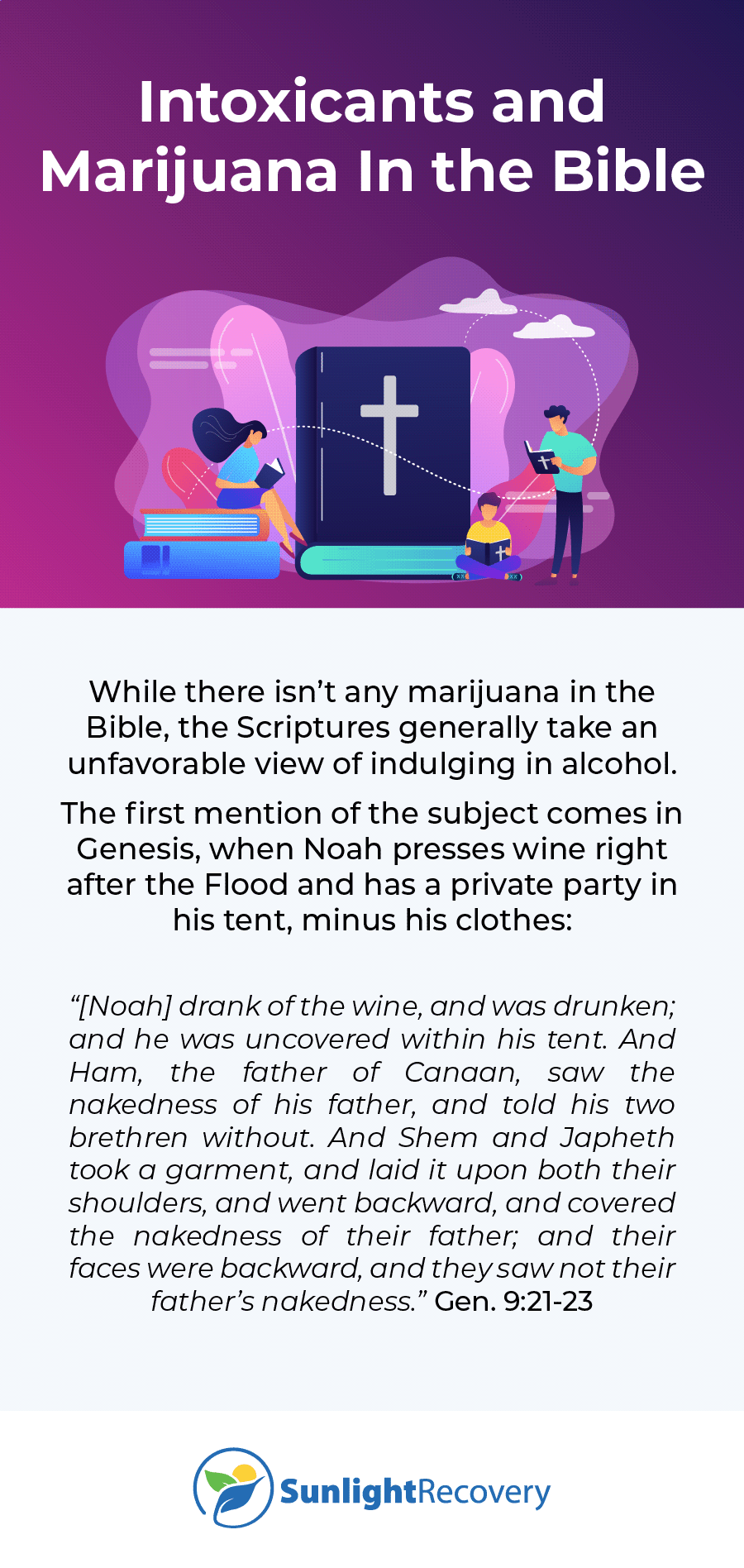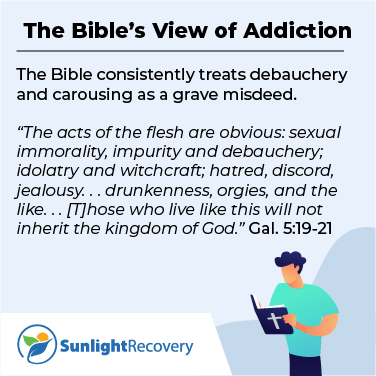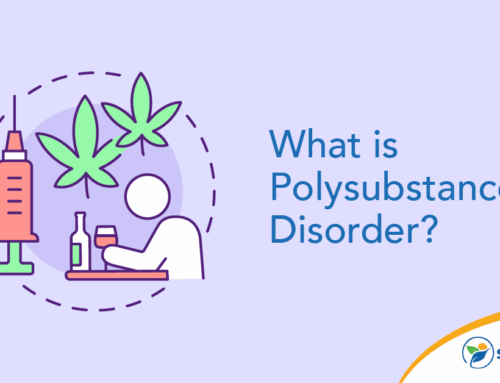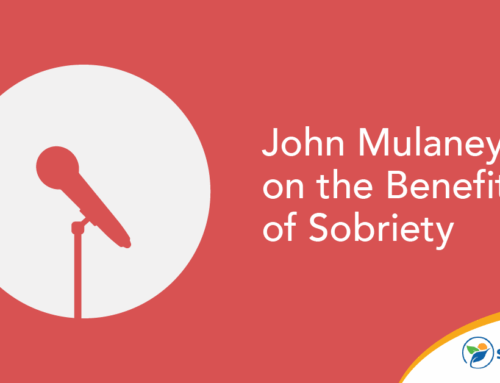Strictly speaking, there’s nothing specific about marijuana in the Bible. People in Israel may have been cultivating cannabis and smoking the crop for recreational purposes as early as 750 BC, a few decades before the Assyrian occupation.
With the prevalence of marijuana use in America — 17% of Americans reported using marijuana in 2023 — many people are interested in what the Bible has to say about weed. While there aren’t any explicit references to cannabis or weed in the Bible, people in Israel may have been cultivating cannabis and smoking the crop for recreational purposes as early as 750 BC, a few decades before the Assyrian occupation. However, scripture does have a lot to say about related subjects, including intoxication, addiction, and health issues. Knowing more about what the Bible says on the subject, even tangentially, may help you decide for yourself whether using marijuana is problematic for people who follow the Bible’s standard for living.
Most of the quotes in this piece are drawn from the King James Version. Many of the cited passages are also available in the Douay–Rheims Bible, which is used by Roman Catholic practitioners.
This article isn’t intended to interpret the Bible for you or push a specific sectarian belief. It’s designed to give you a better understanding of the scriptures’ discussion of various issues that may shed light on marijuana use.
Intoxicants and Marijuana In the Bible
While there isn’t any marijuana in the Bible, the scriptures generally take an unfavorable view of being intoxicated. The first mention of the subject comes in Genesis, when Noah presses wine right after the Flood and has a private party in his tent, minus his clothes:
“[Noah] drank of the wine, and was drunken; and he was uncovered within his tent. And Ham, the father of Canaan, saw the nakedness of his father, and told his two brethren without. And Shem and Japheth took a garment, and laid it upon both their shoulders, and went backward, and covered the nakedness of their father; and their faces were backward, and they saw not their father’s nakedness.” Gen. 9:21-23
Another early reference appears in Proverbs 31:4-7, which warns kings and other authority figures against intoxication but advises it for the sick, the poor and the grieving:
“It is not for kings, O Lemuel, it is not for kings to drink wine; nor for princes strong drink: Lest they drink, and forget the law, and pervert the judgment of any of the afflicted. Give strong drink unto him that is ready to perish, and wine unto those that be of heavy hearts. Let him drink, and forget his poverty, and remember his misery no more.”
Despite frequent warnings, it would be hard to argue that the Bible outright forbids taking intoxicants. Several verses can be found that seem to encourage moderate consumption of alcohol:
“Go thy way, eat thy bread with joy, and drink thy wine with a merry heart; for God now accepteth thy works.” Ecclesiastes 9:7
“He causeth the grass to grow for the cattle, and herb for the service of man: that he may bring forth food out of the earth; And wine that maketh glad the heart of man, and oil to make his face to shine, and bread which strengthens man’s heart.” Psalms 104:14-15
Alcohol also plays a central role in one of the Bible’s most well-known stories, from John 2:1-11, where Jesus performs his first recorded miracle at a wedding and turns jugs of water into fine wine.
The Bible’s View of Addiction
Despite striking some positive notes, the Bible consistently treats debauchery and carousing — what people today would call binge-drinking or escalating substance abuse — as a grave misdeed. Countless verses in both Testaments warn against getting out of control or causing harm to others, either directly or by becoming a drunkard:
“The acts of the flesh are obvious: sexual immorality, impurity and debauchery; idolatry and witchcraft; hatred, discord, jealousy. . . drunkenness, orgies, and the like. . . [T]hose who live like this will not inherit the kingdom of God.” Galatians 5:19-21
“Let us behave decently, as in the daytime, not in carousing and drunkenness, not in sexual immorality and debauchery, not in dissension and jealousy.” Romans 13:13
“Do not get drunk on wine, which leads to debauchery. Instead, be filled with the Spirit.” Ephesians 5:18
“Wine is a mocker and beer a brawler; whoever is led astray by them is not wise.” Proverbs 20:1
The Bible’s Approach to Vice
While it’s true that marijuana isn’t exactly equal to wine in its intoxicating effects or potential for abuse, it seems to most readers that the Bible takes issue mainly with the debauchery and loss of control that often goes with mind-altering substances. This is treated in the text as a vice, which is usually handled as an evil in itself.
As such, it’s not so much a question of whether smoking weed is a sin as much as whether your use of marijuana is part of an overall sinful pattern, which can include gluttony, sloth and other acts of self-harm.
Does the Bible Mention Cannabis?
There’s not a single direct reference to cannabis in the scriptures. And despite loads of credible Hebrew scholars saying the same thing, the myth that the Bible mentions cannabis or marijuana within its pages just won’t quit.
The origin of this myth can be traced back to the work of Sula Benet, a Polish anthropologist active in the 20th century, whose research focused on Polish and Judaic customs. According to J. Alan Branch’s analysis in “Cannabis is in the Bible? Debunking an Interpretative Myth,” Benet’s contribution to this discussion stemmed from her examination of Exodus 30:23-24. In this passage, Moses outlines the ingredients for anointing oil, including the term ganeh-bosem, translated as “aromatic or fragrant cane” in Hebrew. While experts in Hebrew language and culture traditionally interpret this term to refer to balsam, Benet controversially proposed that it referred to cannabis, a theory lacking substantial evidence.
Different Christian Denominations Interpretations of the Bible’s Stance on Marijuana
Some denominations take a strict stance against marijuana use, viewing it as incompatible with biblical teachings on sobriety, self-control and respecting the body as a temple of the Holy Spirit (1 Corinthians 6:19-20). They often emphasize passages such as Ephesians 5:18, which admonishes believers not to be drunk with wine but to be filled with the Spirit.
Conversely, other denominations adopt a more permissive attitude toward marijuana, arguing that the Bible doesn’t explicitly condemn its use and that it can be consumed responsibly and in moderation. They may point to passages such as Genesis 1:29, where God gives humanity every plant yielding seed for food, as evidence of God’s provision of natural resources for human use.
Some denominations remain neutral on the issue, recognizing that individual believers may hold differing views based on their personal convictions and cultural backgrounds. They prioritize principles of love, grace and unity within the body of Christ, allowing room for respectful dialogue and differing interpretations on matters where the Bible is silent or ambiguous.
Biblical Principles That Can Be Applied to the Use of Marijuana
While the Bible doesn’t directly address marijuana, several overarching principles guide believers in navigating its usage. The principle of stewardship emphasizes responsible and mindful use of God-given resources, including the body. This resonates with passages like 1 Corinthians 6:19-20, admonishing believers to honor God with their bodies. Applying this principle to marijuana suggests that users should consider the effects of cannabis on their physical, mental and spiritual well-being, using it in moderation and with discernment.
The principle of sobriety, emphasized in various biblical passages such as Ephesians 5:18, warns against the impairment of judgment and self-control that can accompany substance use. While these passages primarily address alcohol, many Christians extend the principle to include other mind-altering substances like marijuana.
Additionally, the principle of love for others prompts believers to consider the impact of their actions on those around them. This includes refraining from behavior that may cause harm to others or cause them to stumble (Romans 14:13, 1 Corinthians 10:23-24), which may lead some Christians to abstain from marijuana use in certain contexts where it could be a stumbling block to others.
Ultimately, applying biblical principles to marijuana use involves prayerful discernment, informed by scriptural wisdom, personal conviction and consideration of the broader Christian community.
Arguments for and Against the Use of Marijuana From a Biblical Perspective
Arguments in favor often point to passages such as Genesis 1:29, where God grants humanity every plant yielding seed for food, suggesting that marijuana, as a natural plant, is part of God’s provision for human sustenance and enjoyment. Proponents may also argue that marijuana can be used responsibly and in moderation and that its therapeutic benefits, such as pain relief, align with biblical principles of compassion and care for the sick (Matthew 25:36).
On the other hand, arguments against marijuana use from a biblical standpoint often emphasize principles of sobriety, self-control and honoring the body as a temple of the Holy Spirit (1 Corinthians 6:19-20). Critics highlight the potential for marijuana to impair judgment, hinder spiritual growth and lead to addiction or dependency, which contradicts the biblical call to be alert and self-disciplined (1 Thessalonians 5:6, Galatians 5:22-23).
Biblical View of Marijuana’s Influence on Modern Attitudes and Policies
The way people see marijuana today can be shaped by what the Bible says about it. Some folks follow the Bible closely and think marijuana goes against its teachings about staying sober and taking care of your body. They might push for strict rules against using marijuana, like making it illegal.
But not everyone sees it that way. Some people think the Bible’s teachings can be more flexible. They might say marijuana can be okay if it’s used responsibly and helps people who are sick feel better.
These ideas don’t just stay in religious groups. They can affect what laws are made about marijuana. Some people argue for strict laws because they think marijuana is morally wrong. Others say the rules should be more relaxed, especially if it helps people who are suffering or if it could fix unfair treatment in the legal system.
Ultimately, the CDC says that marijuana can be addictive for some users, and it often precedes the use of other substances that are even more harmful to the body, according to the National Institute on Drug Abuse.
Deciding Whether Marijuana is a Sin for You
Interpretations of the Bible can vary from culture to culture, person to person. Whether you believe in the literal truth of the text or use it as a guide to living a good life, the matter of marijuana in the Bible can inform your own path forward, or the path of someone you care for.
If you believe that marijuana use is causing harm to you, or if someone you love is struggling with marijuana abuse, you don’t have to face the problem on your own. The compassionate care team at Sunlight Recovery is available 24 hours a day — contact us to take your first steps on the road to recovery.









